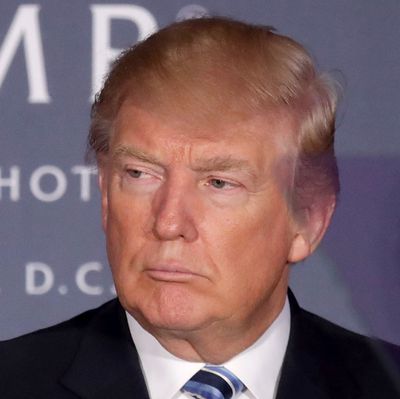
If there’s a theme, a raison d’être, that animates the legal resistance to Donald Trump, it’s the notion that he’s a threat to the Constitution and everything it stands for — equality and due process, good government, the separation of powers, the rule of law. Put differently, the president is seen as a walking, talking constitutional violation. And absent any corrective action by a complacent, complicit Congress, the only way to rein him in is to take him to court.
Citizens for Responsibility and Ethics in Washington, better known as CREW, did exactly that just a few days after Trump took the oath of office. But rather than rest its case on tried and true constitutional provisions, the government watchdog asked a federal judge to bring to life, for the first time in American history, the dead letter of the foreign emoluments clause. The obscure text decrees that “no Person holding any Office of Profit or Trust … shall, without the Consent of the Congress, accept of any present, Emolument, Office, or Title, of any kind whatever, from any King, Prince, or foreign State.”
The Supreme Court has never interpreted what any of that means, let alone declared a sitting president in violation of it. But on Wednesday, a federal judge in Trump’s own backyard, Manhattan, began to crack the code, hearing arguments from CREW and the Department of Justice on the meaning of the clause. Does it forbid Trump, in his official capacity as president of the United States, from profiting off of foreign diplomats who choose to stay at, say, the Trump International Hotel in Washington? And what if a foreign dignitary offers Trump a $1 million gift, no strings attached? Does the clause kick in and require remedial action?
Brett Shumate, the government lawyer dispatched to defend Trump’s business interests and get CREW’s lawsuit dismissed (read that sentence over one more time) insisted that such a gift, without an explicit quid pro quo from Trump, would not qualify as an emolument and thus would be perfectly kosher. Receiving “anything of value” alone is not a “reasonable” interpretation of the clause, Shumate said. Instead, there must be some connection between the foreign windfall and the office of the presidency.
U.S. District Judge George Daniels didn’t seem too impressed. To him, emolument seemed to mean any “compensation” received by a federal official on account of a benevolent foreign entity. “Why isn’t that the most direct and accurate definition of its use?” he asked. “That doesn’t seem to be a complicated concept.” Daniels didn’t quite tip his hand either way, but he suggested that he sees the foreign emoluments clause (not to be confused with the domestic emoluments clause, which CREW also thinks Trump is flouting) as an “anti-bribery” and “anti-corruption” provision meant to keep government honest and free of foreign influence. The Founding Fathers, he noted, were far too smart to have intended a clause with such big words and no teeth.
That may sound like good news to CREW, but the nonprofit has an uphill battle of its own. For one, the group may not even have standing to sue in the first place — as a government watchdog, they serve the public and are not competitors of Trump properties. And no matter what resources they spend or how many times they send former Obama “ethics czar” Norm Eisen to appear on MSNBC, that may not be enough to claim that CREW has been harmed by Trump’s emoluments. Just because “they want to play police,” Daniels complained, doesn’t mean that they “have a right to sue whoever they want to arrest.”
Since filing the lawsuit in January, CREW has brought on other plaintiffs to strengthen their case, among them a restaurant association, a D.C. event booker for major hotel chains, and Eric Goode, a hotelier in New York City. Deepak Gupta, one of the superlawyers representing CREW, told Daniels that all of these plaintiffs, which are competitors in the hospitality sector, have been unfairly disadvantaged by Trump’s wooing of international patrons at his properties. In legal speak, Gupta added, all of them are in the “zone of interests” covered by the foreign emoluments clause.
But perhaps an even bigger hurdle for Judge Daniels will be to decide what to do in the event that he does determine that CREW’s lawsuit should move forward. Can a single federal judge in Manhattan order the president to cure the constitutional violation by asking him to divest? Doesn’t the text of the clause itself leave it to Congress to hash it out with the president? If Daniels so concludes, CREW’s grievance would be a political question that the courts cannot resolve and its lawsuit would be doomed.
After the hearing, I asked Gupta about CREW’s end game with this emoluments gambit. After all, the prior administration brought about a raft of creative, conservative litigation accusing President Obama of lawlessness of all stripes. Is this case just more of the same but from the progressive side? “No, this is not just an academic exercise,” Gupta said. “This is a real lawsuit. And the aim of the lawsuit is to win on the merits and to get a ruling that this is real norm. This is an anti-corruption norm in the Constitution and it has to be taken seriously.”
Daniels said he hopes to rule in CREW v. Trump within the next month or two.





























